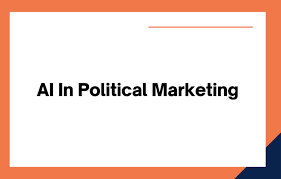
Traditional campaign strategies are no longer sufficient to secure electoral success in the fast-moving arena of modern politics. The advent of artificial intelligence (AI) is revolutionising communications and marketing in all other sectors, so why should politics lag behind? AI is transforming the way political entities engage with voters, offering unparalleled insights and opportunities for strategic advantage.
This article explores in detail the multifaceted nature of political marketing, the role of AI in political marketing and how its use has become indispensable in contemporary political campaigns.
Understanding political marketing
Political marketing refers to the strategic use of marketing techniques and communication strategies by political parties, candidates, or government entities to influence public opinion, shape perceptions, and garner support for their policies, candidates, or agendas. It involves applying principles and practices commonly found in commercial marketing to the political sphere, to achieve electoral success, advance political objectives, or build public trust and confidence.
Elements of political marketing
Political marketing encompasses a wide range of activities, including:
Campaigning
Planning and executing political campaigns, including organising rallies, debates, and public appearances, as well as creating campaign materials such as advertisements, posters, and brochures.
Messaging
Crafting persuasive messages and narratives to communicate the party’s or candidate’s platform, values, and vision to voters. This may involve highlighting accomplishments, addressing issues of concern, and differentiating the party or candidate from competitors.
Targeting
Identifying and targeting specific voter demographics or segments with tailored messages and outreach efforts. This may involve analysing voter data, conducting opinion polls, and employing voter segmentation techniques to understand and reach key constituencies.
Media relations
Managing relationships with the media to ensure favourable coverage and effective dissemination of campaign messages. This may involve press releases, interviews, press conferences, and social media engagement to engage with journalists and news outlets.
Digital marketing
Leveraging digital channels such as social media, email, websites, and online advertising to reach and engage voters. Digital marketing allows for precise targeting, real-time monitoring, and interactions with voters.
Polling and Research
Conducting opinion polls, surveys, and focus groups to assess public sentiment, track voter preferences, and inform campaign strategies. Polling and research provide valuable insights into voter behaviour and attitudes, guiding decision-making and resource allocation.
Overall, political marketing plays a crucial role in shaping electoral outcomes, influencing public discourse, and mobilising support for political actors and agendas. It involves strategic planning, effective communication, and the adaptation of marketing principles to the unique dynamics of the political landscape.
Role of AI in political marketing
Segmentation and targeting
AI’s ability to segment and target voters with precision is paramount in modern political marketing. Using advanced algorithms, AI analyses vast datasets encompassing demographics, psychographics, and behavioural patterns to create nuanced voter profiles. These profiles enable political parties to craft personalised campaigns tailored to resonate with specific segments of the electorate, thereby maximising the impact of their messaging. By understanding the nuanced preferences and concerns of different voter groups, parties can effectively tailor their communication strategies to foster deeper connections and engagement.
Real-time monitoring and adaptation
One of AI’s most significant contributions is its capacity for real-time monitoring and adaptation. AI algorithms continuously scan various data sources, including social media, news outlets, and opinion polls, to gauge public sentiment and identify emerging trends. This real-time feedback enables campaigns to swiftly adjust their messaging, tactics, and resource allocation to align with evolving voter preferences. By staying agile and responsive, political entities can maintain relevance and resonance throughout the electoral cycle, enhancing their competitiveness in a dynamic political landscape.
Efficiency and effectiveness
AI enhances the efficiency and effectiveness of political outreach efforts through predictive analytics and optimisation. By leveraging machine learning algorithms, campaigns can predict voter behaviour, identify swing voters, and prioritise resources accordingly. This predictive capability enables campaigns to allocate resources more efficiently, focusing on key demographics and geographic regions where they are most likely to yield electoral gains. Moreover, AI-driven optimisation ensures that every campaign dollar is spent strategically, maximising the return on investment in terms of voter engagement and persuasion.
Enhanced communication strategies
AI empowers political entities to develop sophisticated communication strategies that resonate with diverse audiences across multiple channels. Natural language processing (NLP) algorithms enable campaigns to analyse and interpret vast amounts of textual data, including social media posts, news articles, and public forums. This analysis provides valuable insights into prevailing sentiments, allowing campaigns to tailor their messaging to address specific concerns and aspirations effectively. Moreover, AI-powered chatbots and virtual assistants enable personalised interactions with voters, facilitating engagement and information dissemination on a large scale.
Ethical and regulatory considerations
While AI offers tremendous potential for enhancing political marketing, its use also raises ethical and regulatory concerns. Issues such as data privacy, algorithmic bias, and the manipulation of public opinion require careful consideration and oversight. Political entities must ensure transparency and accountability in their use of AI technologies, safeguarding the integrity of democratic processes and protecting individual rights. Policymakers must work collaboratively with technologists, civil society, and other stakeholders to develop robust regulatory frameworks that strike a balance between innovation and ethical governance.
Emerging trends and global perspectives
Looking ahead, it’s crucial to consider emerging trends and global perspectives on AI in political marketing. Moreover, examining public attitudes towards AI in politics and its intersection with other emerging technologies could enrich discussions on ethical considerations and regulatory frameworks.
In conclusion, the role of AI in political marketing is multifaceted and indispensable in modern politics. From segmentation and targeting to real-time monitoring and optimisation, AI empowers political entities to navigate the complexities of electoral competition with precision and efficiency.
However, as AI continues to shape the political landscape, ethical considerations and regulatory frameworks must evolve in tandem to safeguard democratic values and ensure the integrity of electoral processes.
Embracing AI responsibly can pave the way for more informed, inclusive, and engaging political discourse, fostering a healthier democracy for generations to come.










